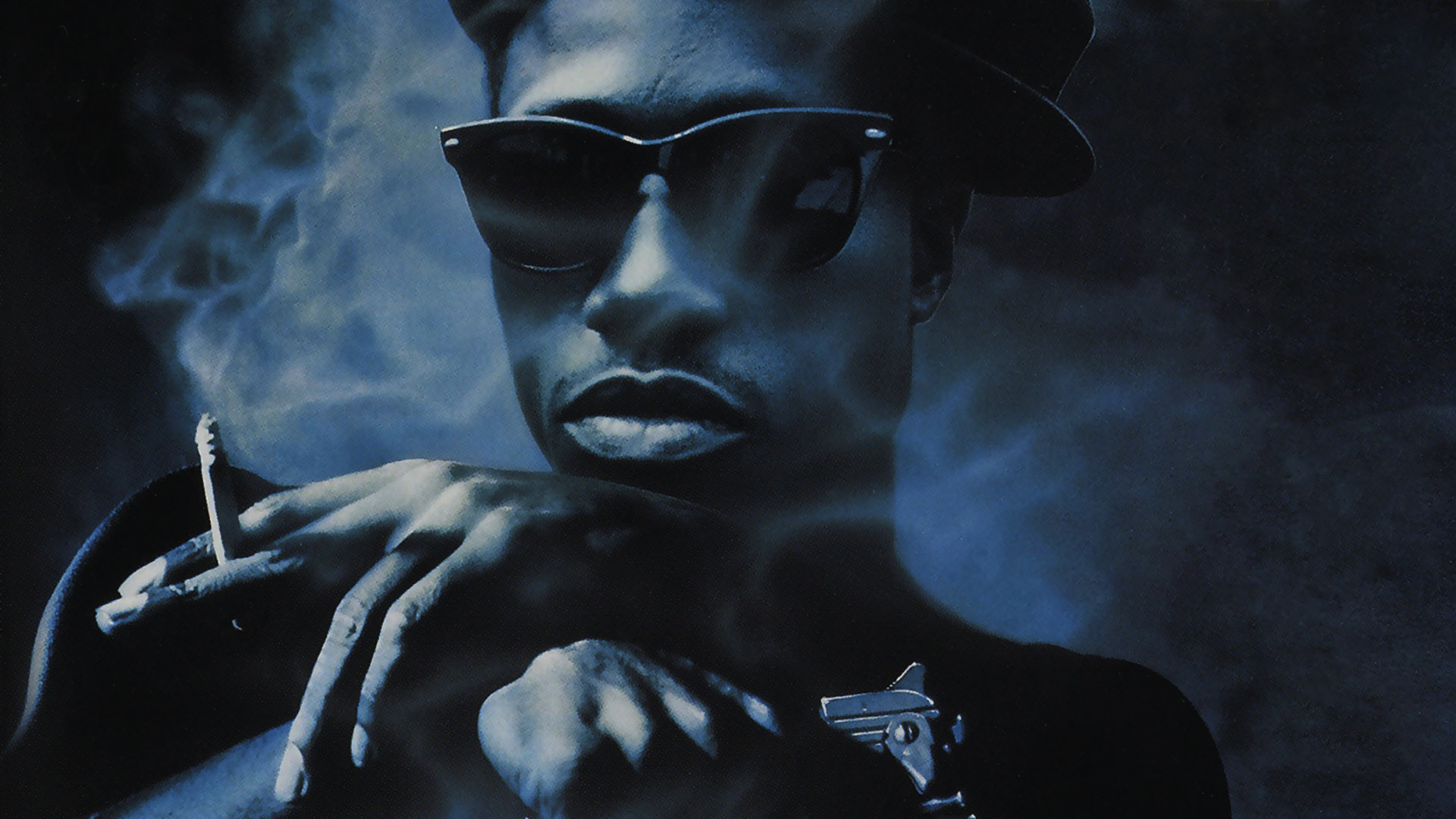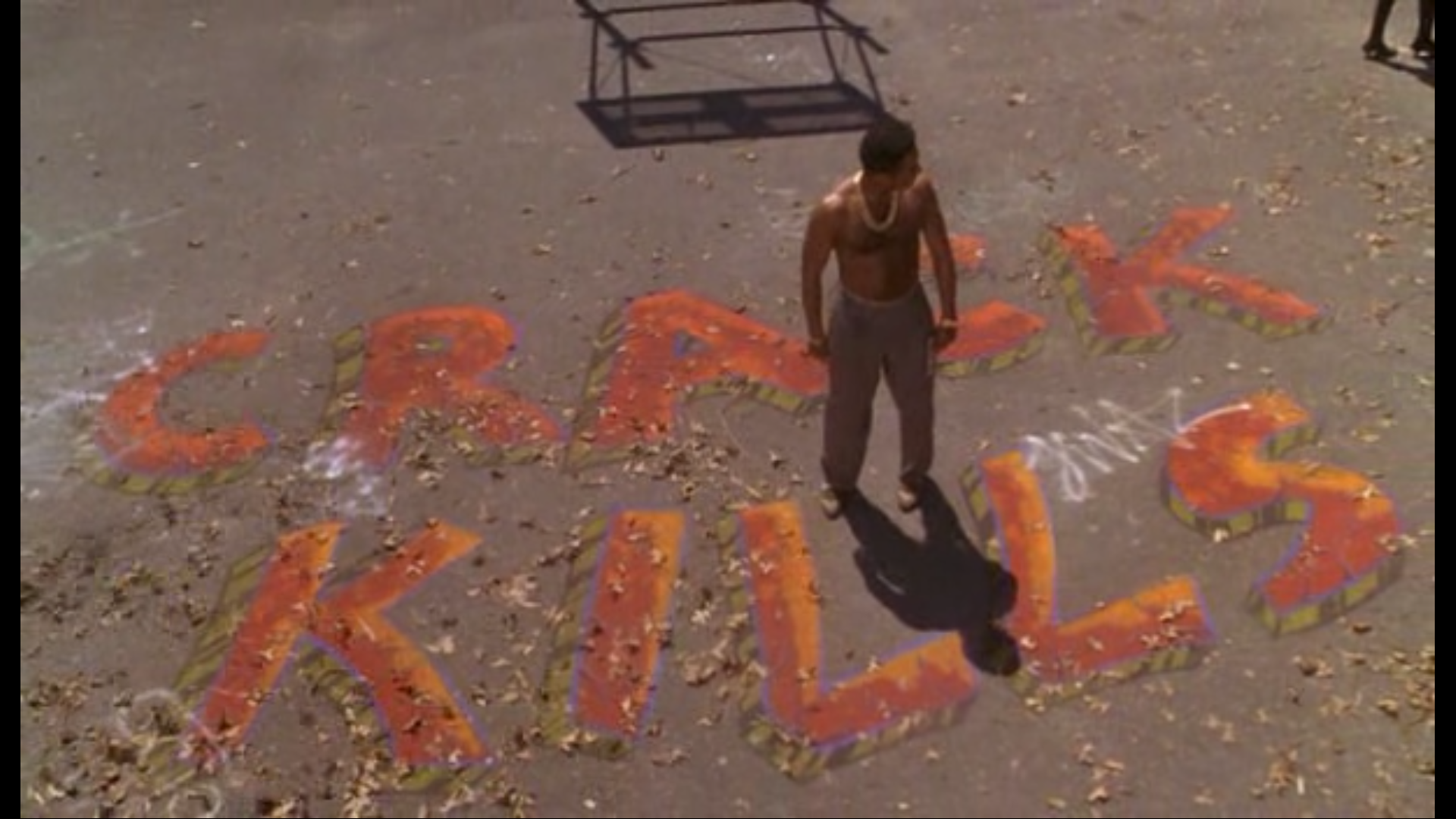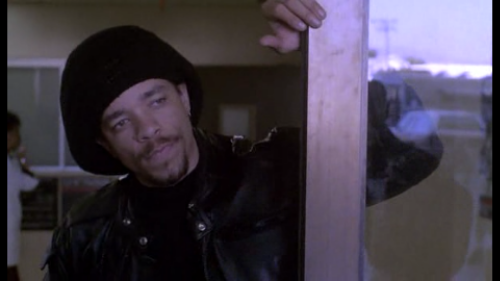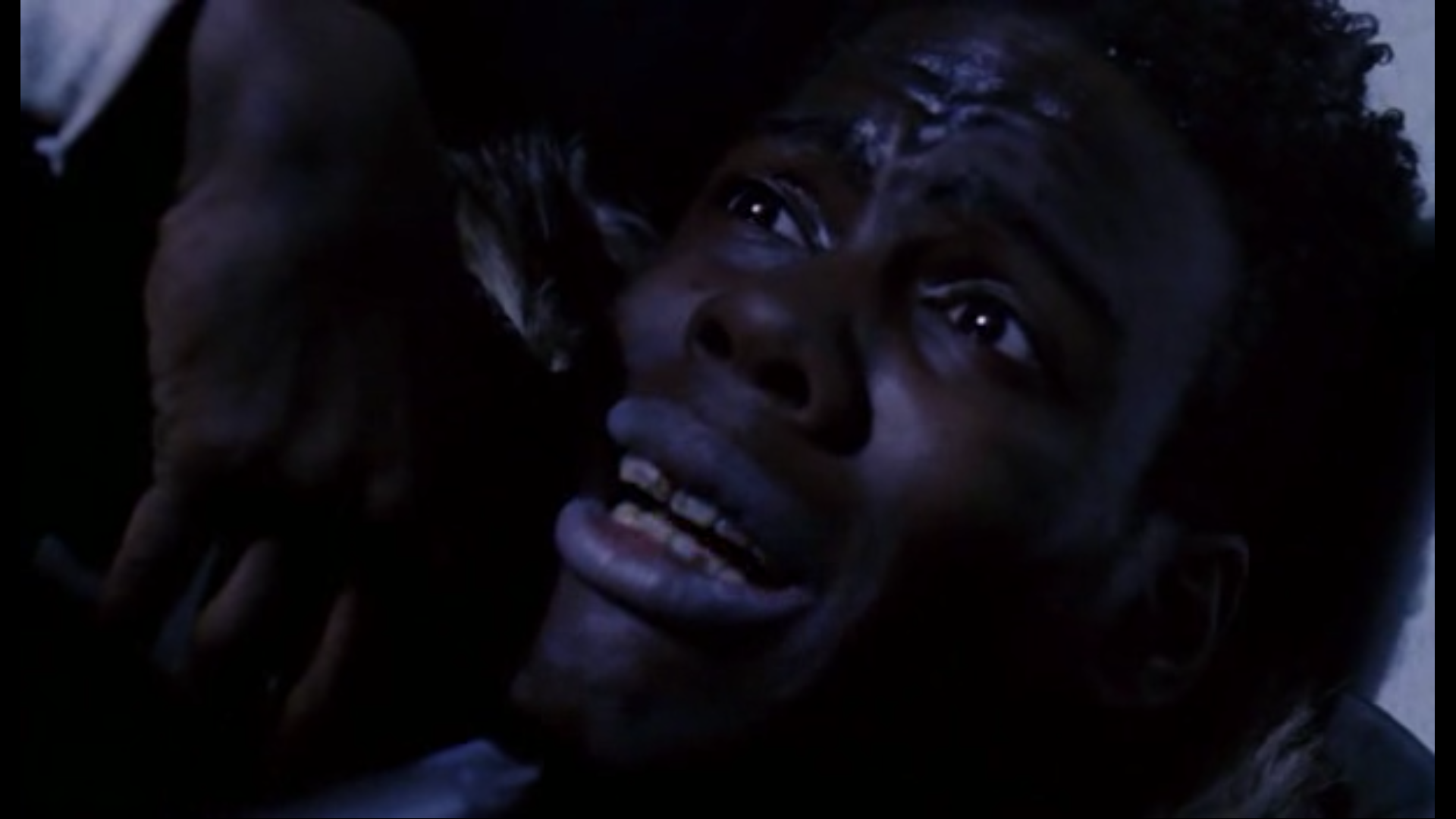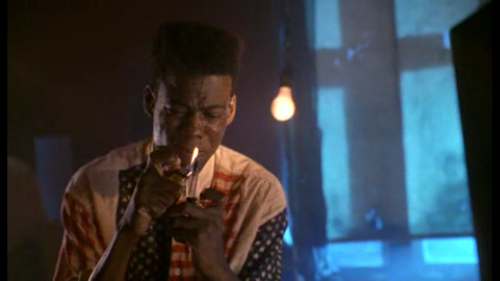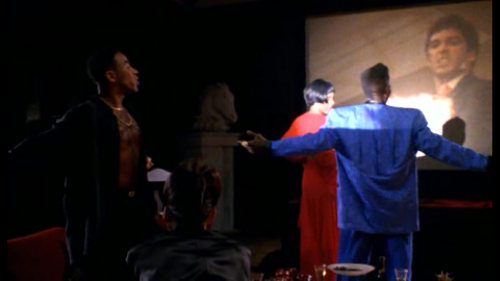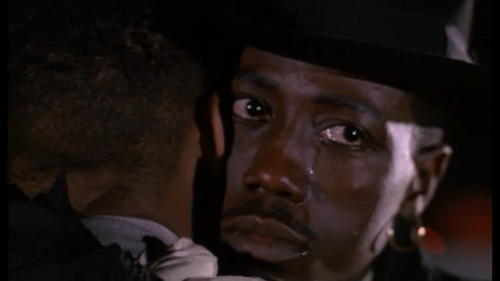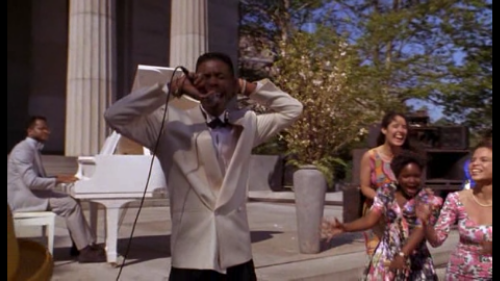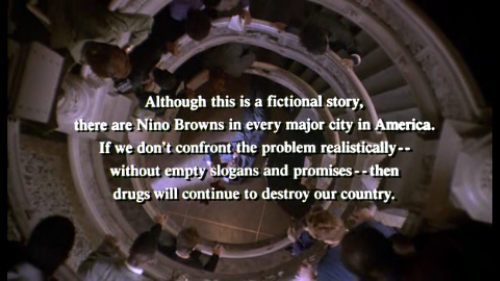Diversity and representation have long been a serious issue in the film industry, and 12 Years A Slave winning some Oscars hasn’t exactly changed that. Outside of that prestigious anomaly, people rarely imagine black film to be much more than gangster movies, cookout comedies, and Tyler Perry. Our very own Dominic Griffin will prove otherwise, shedding a light on unsung, underrated, forgotten and new films that show the breadth and versatility of the black voice in film. Named after one of Billy Dee Williams’ affectionate nicknames, this is Dark Gable Presents…
Personally, I have a hard time reconciling my love for gangster movies (and the wide swath of crime fiction I’ve devoted my life to consuming) with my feelings on the effect of gangsters on society. The iconography and swagger of gun toting outlaws, particularly from the Prohibition era, often idealized on the silver screen, is inescapably intoxicating. We love bad guys in America. We idolize those who live outside the law and always have. In film, we’ve had decades aggrandizing Italian mobsters, and in these movies, we’re rarely expected to weigh the balance of societal damage done by their misdeeds. For God’s sake, there is a show called Mob Wives where we’re invited to laugh along with these stereotypes who purportedly profit from a life of crime. That shit is supposed to be a gas.
Alternatively, it’s impossible to make a film about black gangsters without being expected to craft a crippling treatise on the dangers of breaking the law and the detriment it does to the community. Martin Scorsese was able to make himself a household name with films like Goodfellas, but The Hughes Brothers had to deal with a lot of flack for the problematic worlds they presented in Menace II Society and Dead Presidents. Our selection for this week’s DGP strikes a smart balance between the stylized, action thriller pacing and tone of a shameless, exploitative gangster picture without having to entirely shirk any social responsibility for desensitizing its audience to blood, violence and drugs.
We’re taking a trip to New Jack City.
Now, this film was new to me, but not because I had never seen it. Growing up, New Jack City was one of the early films of my youth. Though I have always resided in the DMV area, much of my family is from NYC. As such, I used to take pretty regular trips to Brooklyn to visit relatives around Flatbush, and being a chubby mulatto kid from the ‘burbs, my entire image of the Big Apple was informed by underrated black horror film Def By Temptation. When I first saw New Jack City, I subconsciously lumped it in with that movie, coupled with the first Teenage Mutant Ninja Turtles and Ron Howard’s The Paper to form a strange, dreamlike sound stage vision of New York in my brain, despite being intimately familiar with the real thing. Memory is weird.
Seeing it again for the first time as a seasoned, obsessive adult cinephile, I’m deeply ashamed for not spending more of my life singing this film’s praises. Directed by Black Cinema Royalty Marvin Van Peebles (son of another MVP, Melvin, who single handedly birthed the entire blaxploitation genre with his debut feature Sweet Sweetback’s Baadasssss Song), New Jack City is a lot more movie than I remember. Metamorphosing much of what we have come to expect from the gangster movie genre by contorting it into something akin to a comic book. On the surface, the film’s premise is simple: in the mid 1980s, a drug dealer by the name of Nino Brown (Wesley Snipes) gets the idea from his brother G-Money (Allen Payne) to diversify his product and specialize in moving crack cocaine. Ice-T, the man who made the song “Cop Killer,” appears in his first role as a police officer who is trying to save his community from the crack epidemic, singularly driven to bring Brown down with the help of a whacked out Judd Nelson.
Van Peebles (who also appears on screen as Stone, Ice-T and Nelson’s superior) flexes his filmmaking chops by balancing a topic that is urgent and serious with a tone that is surreal and larger than life as to appear comedic. Imagine the first season of The Wire if it were also Tim Burton’s Batman. The iconic supervillainy of Wesley Snipes’ Nino Brown seems to be the focal point, despite Ice-T’s Scotty Appleton ostensibly being the actual protagonist, not unlike Burton’s take on The Dark Knight. Van Peebles introduces his vision for New York City in the film’s opening moments with a bravura energy that I didn’t quite grasp in my youth. His camera moves and stalks over the streets with a Touch of Evil-esque crawl, before darting expressively between off-kilter, canted angles that suggest a shocking dynamism. The contrast between Nino dumping an indebted dealer off a bridge and the exhilarating footchase with Scotty going after amateur stick-up kid Pookie (Chris Rock) sets the tone for the entire film: dark and tragically real with a breathless edge of genre invention.
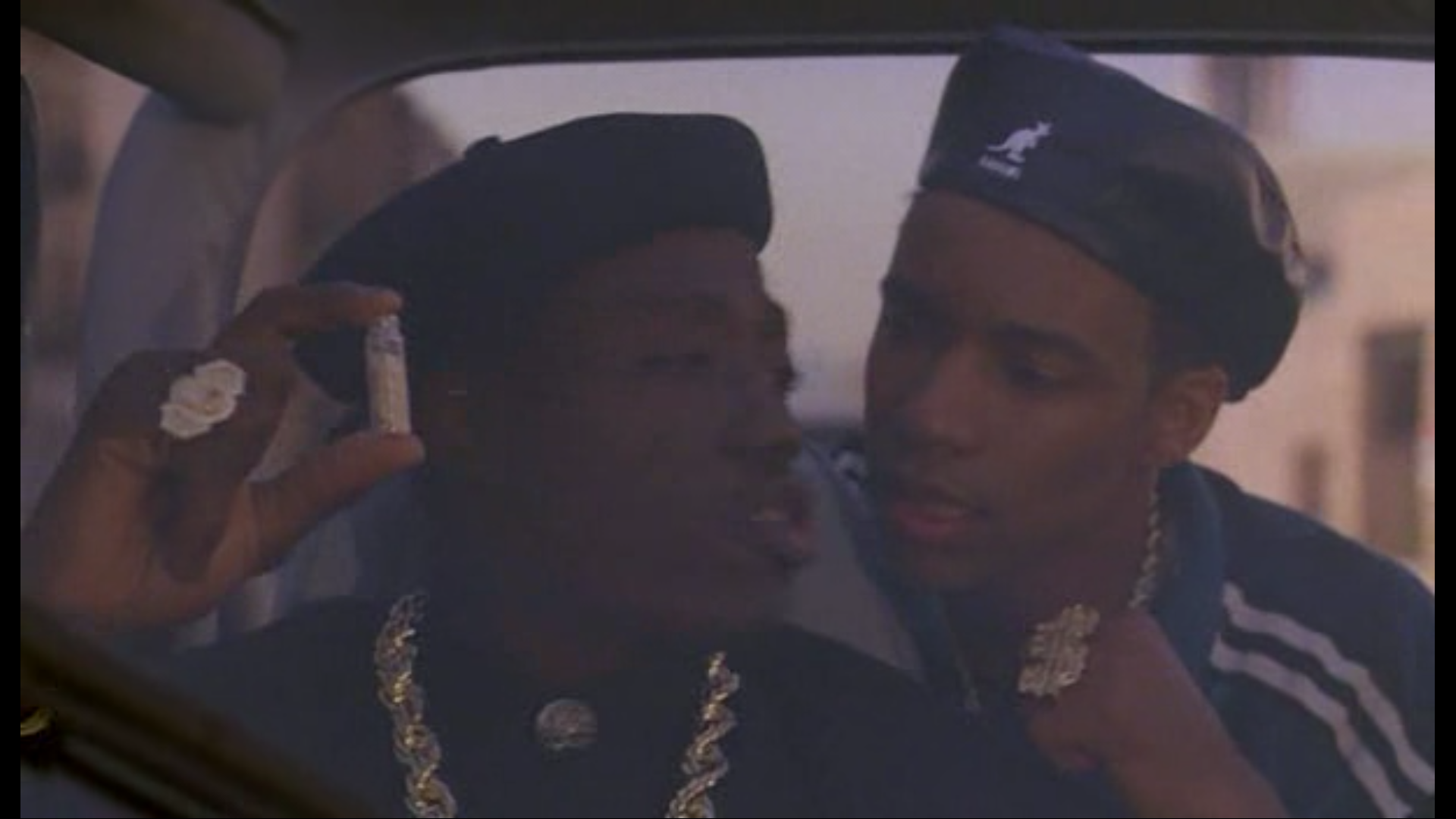
Pictured, Megatron (Wesley Snipes) and Starscream (Allen Payne) discuss the relative economics of free basing.
I think the best way to illustrate how strange a beast New Jack City is would be to see the oddball transition that takes us from the hyperactive and efficiently expository first act into the moodier, but no less intriguing middle third. As Nino, G-Money, The Duh Duh Man (Bill Nunn as a stuttering heavy), and Kareem (a criminally miscast Christopher Williams as a tech-savvy banker who helps legitimize the operation) form the Cash Money Brothers collective (sound familiar?) and set up their Crack Dealer Legion of Doom at The Carter projects (no, seriously, noticing a motif?), the film embarks on a montage of their criminal dominance, utilizing an a capella medley of “For The Love of Money” and “Living For The City” dually performed by vocal groups Troop and Lavert as connective tissue. Displaying the passage of time using cuts and music isn’t weird, but having two different singing groups physically depicted on screen, three years apart, singing some kind of duet, is as out there an artistic choice for a gangster picture as I can conjure, despite how effective it ends up being in execution.
Once those years have passed and we’re reintroduced to a triumphant Vice King Nino Brown and the establishment that doesn’t care enough to to stop him, Scotty continues lamenting his inability to affect change by standing around and looking laconically pensive, like this:
Stone hand-picks Scotty and Judd Nelson’s Nick Peretti (who, headcanon alert, is just John Bender grown up as a nutty detective) to head up a special task force designed to take Nino down. The laughably thin chemistry here feels like Shane Black ghostwriting The Untouchables for whiskey money, but somehow, it works. We’re really made to believe times have gotten so tough that these desperate mortals are all we have left.
The most dramatic change in the three years since Nino came to power is the darkened shroud that envelopes The Carter projects. As if something out of a Disney movie, the entire community seems encased in some hellish snowglobe, only the wintry mix is just blow and baking powder. No figure exemplifies this better than Chris Rock’s Pookie.
Often a bit of a memetic punchline when the film is discussed in present day, Rock’s transformation from cocky thief to the desperate and violent crack fiend has serious power. It reminds me a little of Joe Pesci’s turn in Raging Bull, where he displays sincere pathos, but his comedic presence masks its depth. Scotty finds Pookie and decides to save his life, helping him get clean in rehab in a montage that feels a little tone deaf (like, endless shots of Ice-T staring at Chris Rock dramatically while he sweats and cries is objectively hilarious) but ultimately rings true. To repay Scotty for saving his life, Pookie goes undercover working for CMB, first as a lookout, then, for his hard work, is promoted to working in “the drugstore” under G-Money. A recovering crackhead working as a supervisor in a room where naked women cook and bag crack. What could go wrong?
Pookie’s inevitable downward spiral accompanies some of my favorite visuals in the film, namely the scenes of The Carter as a post-apocalyptic compound ravaged by drug use and crime. It looks like something out of Judge Dredd, which might lead you to believe Van Peebles is selling out a very real problem by depicting it in science fiction terms. Truthfully, this creative choice, while over the top, fits, especially when you’re reminded that, no matter how cartoonish New Jack City gets at its oddest, it is based on things that actually happened. Judd Nelson blowing an iron door with plastique explosive before disarming a bomb strapped to an outed Pookie’s lifeless body could be in a Straight To DVD rip-off of 24, yes, but the sunken, hollow eyes of the fiending masses seen inside “The Enterprise” (the rec room of sorts where Nino’s customers “beam up”) could be straight out of a documentary.
After discovering their infiltrator and destroying The Carter to save their ass, the power structure in CMB shifts. Nino’s always been top dog, but G-Money and the other cohorts considered it a family enterprise. Brown asserts regularly and totally that HE built this, not his loyal girlfriend who gave him the books he read that widened his palette enough to make such gambits, not the Italian mobsters who helped him start the operation in the first place, and certainly not his own brother who put him onto their miracle product in the first place. When CMB gathers around a meeting table, the rally cry of “Am I my brother’s keeper?” is always met with the response, “Yes, I am!” It’s said as much a privilege as it is a duty. Nino Brown, the entity, is meant to evoke every nihilistic criminal who peddles death to his own people, but Snipes imbues his kingpin with a preternatural charisma and the sense that he had no choice but this one. He has the fire Tupac had in his eyes in those early acting roles with a Herculean amount of swagger that feels more like a shield than a rapier. To prosper, to thrive and to take care of his own isn’t just greed, but a survival instinct grown bitter and inhuman. Get Rich or Die Trying.
In New Jack City, we are presented with maybe the most influential persona in modern crime fiction. Nino dresses like a hip hop star, conducts himself like Dr. Doom, and watches Scarface unironically. He mocks Tony Montana, but is undone by hubris just the same. He steals his brother’s girl for sport and spurns his own, twin acts of betrayal that ultimately lead to his downfall. The deterioration of Nino and G’s relationship is one of the saddest developments in the film, as G turns to crack much the way Pookie does. Nino prospers in a world where people have so little that they’ll give everything to escape that sense of hopelessness, but the environment he builds in his circle duplicates that negativity. He may not care if he sells drugs to strangers, but ultimately, he drives his own brother to poison their endeavors, which of course leads to G’s death at Nino’s own hands.
The film’s third act feels almost like a different movie. Scotty and Peretti go rogue, with Scotty going undercover and getting closer to Nino than he had planned, their bond as crooked and rife with the stench of fate as Bruce Wayne and Jack Napier. (Look, I know it seems like I’m pushing the Batman thing, but this movie arbitrarily reveals that Scotty hates drug dealers because one killed his mother. We discover the dealer was Nino. They’re one small step away from “You made me” / “You made me first.”) The entire thing even ends in the sort of steam and pipe factory that creates The Joker in Batman 89, a thrilling action set piece completely undermined by the beautiful lyricism of an earlier sequence that features an attempted mob hit at a wedding bankrolled by Nino for a corrupt preacher’s daughter.
No, you don’t understand. Keith Sweat shows up as himself to sing “There You Go Telling Me No (Again)” (at a fucking wedding) and the entire thing devolves into a Battleship Potemkin homage (by way of the aforementioned Untouchables), wherein Nino uses a small child as a human shield and Scott is conflicted as to whether or not he should just kill Nino and be done with it, foreshadowing the film’s real conclusion.
Unlike Leo DiCaprio’s Jordan Belfort, Nino Brown, despite being his own twisted reflection of the bloodstained American Dream, isn’t allotted the chance to silently repent his misdeeds as a motivational speaker. Yes, Jordan Belfort never stabbed a prominent 90s R&B singer with a cane sword before trying to choke him to death with a dog leash, but still. The black gangster has to die in the end. His transgressions against his own people, deplorable though they may be, pale in comparison to his flagrant flying in the face of the accepted class structure.
Overwrought at times and a little all over the place, New Jack City is still must see cinema. Judd Nelson presages Robert Downey Jr’s entire second career as an eccentric and prickly white cop who hides a heart of gold beneath patchy facial hair and a sleeve full of smarmy one liners. The soundtrack, full of period appropriate New Jack Swing and hip hop, helps the images to pop off the screen better than any 3D conversion could have. Ice-T delivers the all-time great line of dialogue “I want to shoot you so bad, my dick is hard.” It’s as exciting and baffling a cops and criminals caper flick has ever been, and its multicultural cast was ahead of its time, foreshadowing the melting pot of the Fast & Furious films by a decade.
If you like balls to the wall crime thrillers that manage to create real social commentary in between gunfights, book yourself a ticket to New Jack City.
If you have any films you would like to see covered in this column, hit us up on Twitter @DeadshirtDotNet and we’ll get them in front of Dom.

